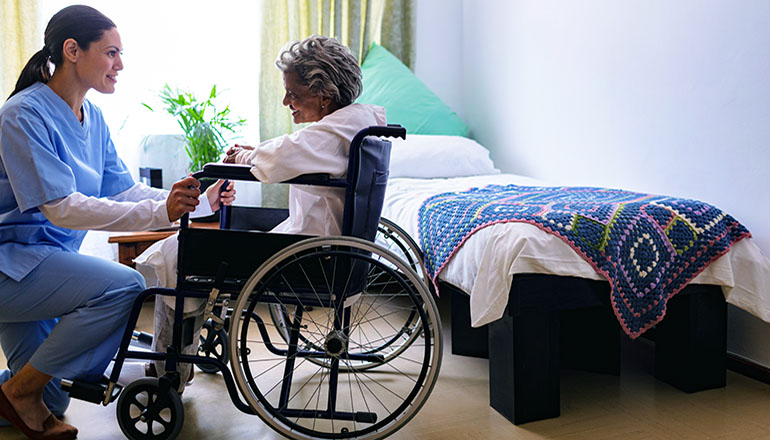(Missouri Independent) – With over 40% of Missouri’s nursing home staff still unvaccinated, the state health department is giving long-term care facilities a route to avoid losing their license if they shut down due to staffing shortfalls after a federal vaccine requirement kicks in next month.
On Friday, the Department of Health and Senior Services (DHSS) published an emergency rule that would allow nursing homes to close for up to two years and not have to relinquish their licenses. The rule was first reported Friday by the Associated Press.
The emergency rule is in response to a recently-enacted federal requirement issued by the Centers for Medicare and Medicaid Services that stipulates health care workers, including in nursing homes, who participate in Medicare and Medicaid programs must receive at least one dose of a COVID vaccine by Dec. 5 and be fully vaccinated by Jan. 4.
Facilities that fail to comply with the new regulations may face penalties, including being fined, denied federal payments, or even removed from the Medicare and Medicaid programs. Last week, a coalition of 10 attorneys generals, including Missouri’s Attorney General Eric Schmitt and Kansas Attorney General Derek Schmidt, sued to stop the rule from going into effect.
A representative for CMS did not immediately respond to a request for comment on the emergency regulation Monday.
In Missouri, nearly 57% of staff in nursing homes are vaccinated — the lowest nursing home staff vaccination rate in the nation. In Kansas, that rate sits at nearly 67%, according to CMS data.
DHSS anticipates many of the unvaccinated staff working at long-term care facilities “will not choose to get vaccinated, even with this vaccine mandate from CMS,” Friday’s rule reads. As a result, some facilities may have to close without sufficient staffing levels to care for residents.
Staffing shortages existed even before the pandemic, and according to the American Health Care Association and National Center for Assisted Living, nursing homes nationwide have lost roughly 14% of their workforce, or about 221,000 jobs since the start of the pandemic.
The emergency regulations, which go into effect on Nov. 29 and last through May 27, 2022, would establish a temporary closure process for facilities. It aims to ensure that facilities won’t have to give up their Medicare and Medicaid provider agreements with CMS if they close and would not have to comply with all new requirements by being deemed a new facility, rather than an existing one.
“This can be very expensive for facilities to meet new requirements that they did not have to meet as existing facilities,” the emergency rule reads.
Under the requirements, facilities must submit a plan detailing the closure to DHSS, which will need to be approved. From there, facilities will receive a probationary license and discharge all residents. Transfers of ownership cannot occur during the temporary closure period, and in order to reopen DHSS will conduct a full inspection of the facility.
Any facilities that remain closed longer than two years will be considered permanently closed, according to the emergency regulation.
Marjorie Moore, the executive director of VOYCE, a St. Louis nonprofit that advocates for quality living across long-term care, said it seems the state is trying to provide a reasonable option for facilities that may need a small period to close and ramp up staffing levels.
Moore said she envisions facilities operated by larger chains will likely be the ones that would be able to take advantage of the rule. Smaller, locally-owned facilities may not be able to weather the financial hit of having to close — even temporarily — and maintain their facilities in good working condition while they go unused.
“Our biggest concern is that residents should be able to choose where they’re living,” Moore said. “So we don’t want a resident moved out of a facility without having a choice of where they’re going, and being able to make an informed choice about that.”
That’s especially true for residents in rural areas, Moore said, “where the facility that they’re currently in may be the only facility for 40 miles that can take them — or longer.”
Moore recommended residents who feel they’re being moved to a facility that doesn’t fit their needs reach out to their local public advocate, often referred to as an ombudsman, for help.
“We want to make sure,” Moore said, “that residents have the ability to be somewhere that can take care of them.”
(Photo licensed through Envato Elements)







